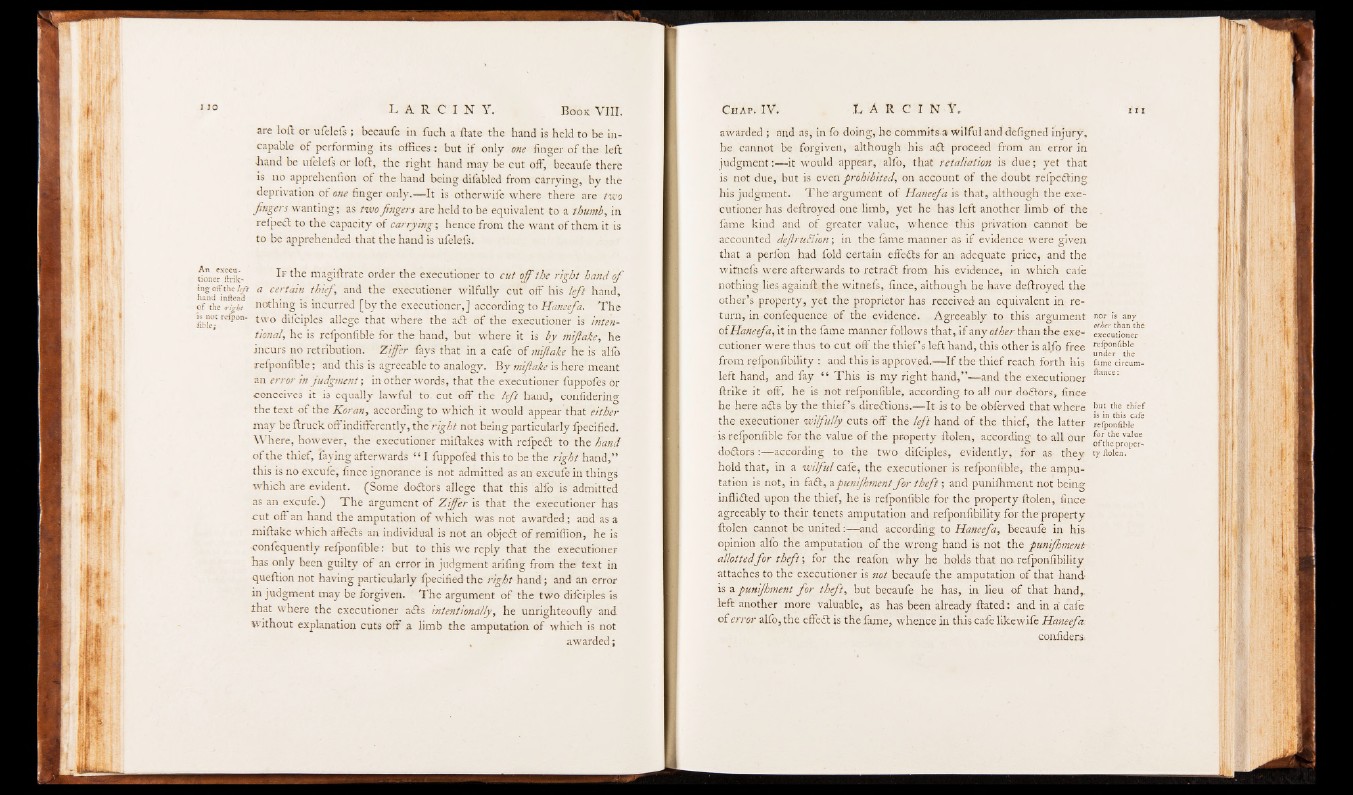
i f
are loft or ufelefs ; becaufe in fuch a ftate the hand is held to be incapable
of performing its offices: but if only one finger of the left
•hand be ufelefs or loft, the right hand may be cut off, becaufe there
is no apprehenfion of the hand being difabled from carrying, by the
deprivation of one finger only.— It is otherwife where there are two
fingers wanting; as two fingers are held to be equivalent to a thumb, in
refpedt to the capacity of carrying; hence from the want of them it is
to be apprehended that the hand is ufelefs.
tioner^ftrik- If magiftrate order the executioner to cut off the right hand o f
ing; off the/y? a certain thief, and the executioner wilfully cut off his left hand,
hand inllead , . . . . r. . . , « J
of the right nothing is incurred [by the executioner,] according to Haneefa. The
‘4 "°.' relP0“- two difciples allege that where the a£t of the executioner is intentional,
he is refponfible for the hand, but where it is by mijlake, he
incurs no retribution. Ziffer fays that in a cafe of mijlake he is alfo
refponfible; and this is agreeable to analogy. By mijlake is here meant
an error in judgment; in other words, that the executioner fuppofes or
conceives it is equally lawful to- cut off the left hand, confidering
the text o f the Koran, according to which it would appear that either
may be ftruck off indifferently, the right not being particularly fpecified.
Where, however, the executioner miftakes with relpedt to the hand
of the thief, faying afterwards “ I fuppofed this to be the right hand,”
this is no excufe, fince ignorance is not admitted as an excufe in things
which are evident. (Some doctors allege that this alfo is admitted
as an excufe.) The argument of Ziffer is that the executioner has
cut off an hand the amputation of which was not awarded.; and as a
miftake which affedts an individual is not an objedt of remiffion, he is
confequently relponfible: but to this we reply that the executioner
has only been guilty of an error in judgment arifing from the text in
queftion not having particularly fpecified the right hand; and an error
in judgment may be forgiven. The argument of the two difciples is
that where the executioner adfs intentionally, he unrighteoufly and
without explanation cuts off a limb the amputation of which is not
awarded;
awarded ; and as, in fo doing, he commits » wilful and defigned injury,
he cannot be forgiven, although his adl proceed from an error in
judgment:— it would appear, alfo, that retaliation is due; yet that
is not due, but is even prohibited, on account of the doubt refpedting
his judgment. The'argument of Haneefa is that, although the executioner
has deftroyed one limb, yet he has left another limb of the
fame kind and of greater value, whence this privation cannot be
accounted defiruElion; in the fame manner as if evidence were given
that a perfon had fold certain effects for an adequate price, and the
witnefs were afterwards to retradl from his evidence, in which cafe
nothing lies, againft the witnefs, fince, although he have deftroyed the
other’s property, yet the proprietor has received an equivalent in return,
in confequence of the evidence. Agreeably to this argument
ofHaneefa, it in the fame manner follows that, if any other than the executioner
were thus to cut off the thief’s left hand, this other is alfo free
from refponfibility : and this is approved.— If the thief reach forth his
left hand, and fay “ This is my right hand,”— and the executioner
ftrike it off, he is not refponfible, according to all ou-r dodtors, fince-
he here adts by the thief’s diredtions.— It is to be obferved that where
the executioner wilfully cuts off the left hand; of the thief, the latter
is refponfible for the value of the property ftolen, according to all our
doctors:— according to the two difciples, evidently, for as they
hold that, in a wilful cafe, the executioner is refponfible, the amputation
is not, in fadt, apunijhment fo r th eft; and punifhment not being
inflidled upon the thief, he is refponfible for the property ftolen, fince:
agreeably to their tenets amputation and refponfibility for the property
ftolen cannot be united:— and according to Haneefa, Becaufc in his-
opinion alfo the amputation of the wrong hand is not the punijhment
allottedfor theft; for the reafon why he holds that no. refponfibility
attaches to the executioner is not becaufe the amputation of that hand
is a punijhment fo r theft, but becaufe he has,, in lieu of that hand,,
left another more valuable, as has been already ftated: and in a' cafe
of error alfo, the effedt is the fame,, whence in this cafe likewife Haneefa;
confiders.
nor is any
other than the
executioner
relponfible
under the
fame circum-
ftance:
but the thief
is in this cafe
relponfible
for the value
o f the property
ftolen.